A Sales Agreement is a vital legal document that outlines the terms and conditions of a transaction between a buyer and a seller. It defines the rights, obligations, and…
continue reading
13+ SAMPLE Investment Consulting Agreement
-
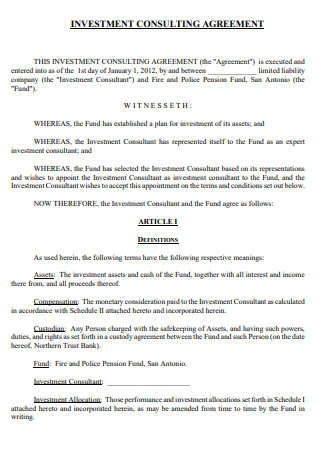
Investment Consulting Agreement
download now -
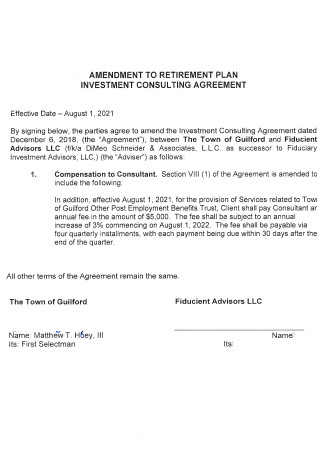
Retirement Plan Investment Consulting Agreement
download now -

Execution of Investment Consulting Agreement
download now -
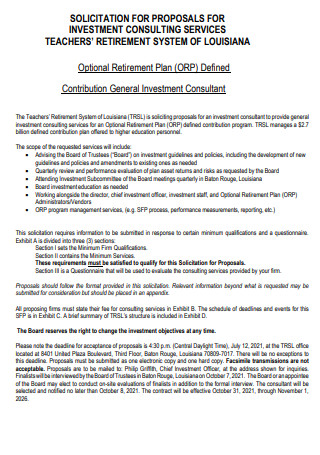
General Investment Consulting Agreement
download now -
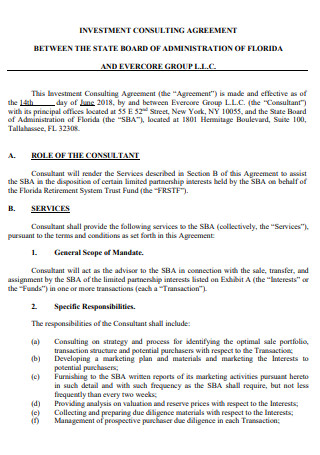
State Investment Consulting Agreement
download now -
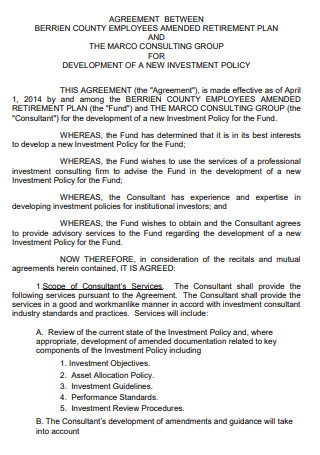
New Investment Policy Consulting Agreement
download now -
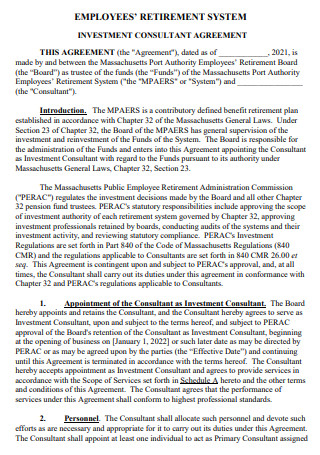
Employees Investment Consulting Agreement
download now -
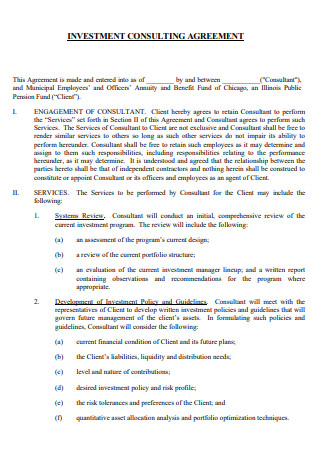
Simple Investment Consulting Agreement
download now -
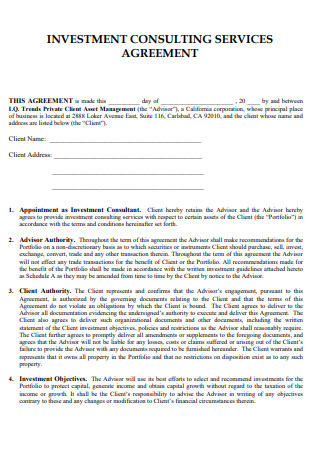
Investment Consulting Services Agreement
download now -
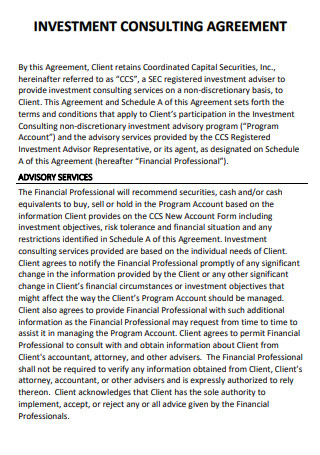
Investment Consulting Agreement Example
download now -
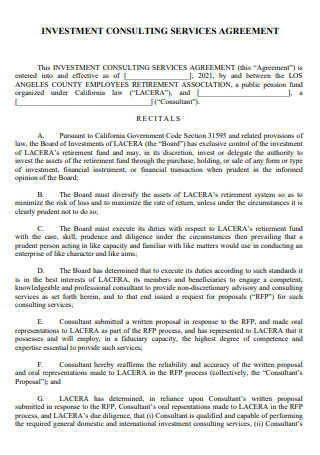
Sample Investment Consulting Services Agreement
download now -
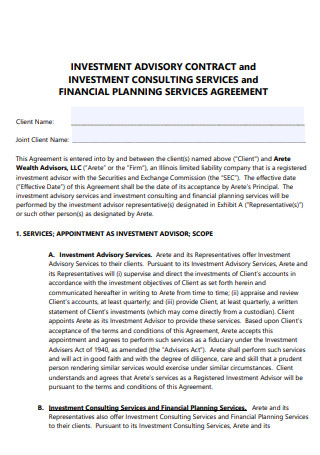
Investment Consulting Financial Planning Agreement
download now -
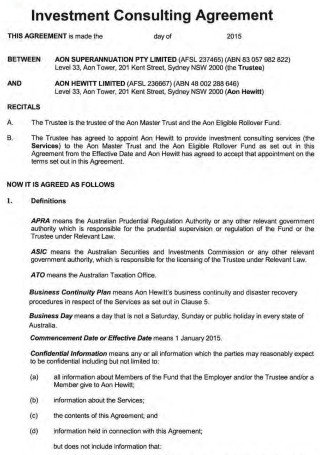
Investment Consulting Agreement Template
download now -
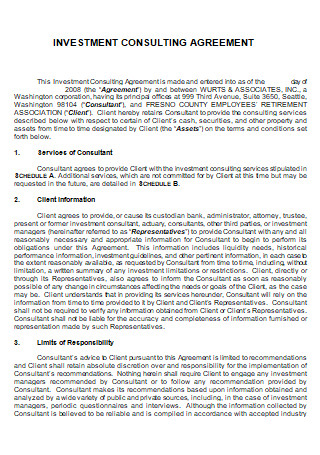
Printable Investment Consulting Agreement
download now
What Is an Investment Consulting Agreement?
Clients hire an investment consultant to assist them in developing a plan for investing. Clients can be anyone or anything, from small businesses to big corporations. The job of the investment consultant is to look at the client’s finances and develop a plan to help them reach their goals. A consulting agreement is an agreement between an investment consultant and a client who wants to hire the consultant for certain services for a certain amount of time and a certain fee. In a consulting contract, you should spell out your responsibilities and what you promise to give the client. The contract may also say how much work you’ll do at the client’s office and how often you’ll work from home. Statistics show that only 20% of people who make their living investing are successful at it. Success could be defined as getting returns that are as good as or better than the average profits made on the stock market.
Benefits of Investing
Investing is something that all individuals should do. Investing has so many advantages that it would be foolish not to begin. Investing is how you can amass wealth and achieve financial security. It’s the only way to get there; you can’t save your way to a million dollars. First, why should you invest rather than merely save? Or, why not simply earn more and more money and live off of that? Here’s how investing should work: you move money from your working bucket into other buckets, such as stocks, bonds, and real estate. Then, when you retire, those buckets will pay you! So then, let’s delve deeper into these perks!
Tips To Consider Before Investing
In light of recent market happenings, you may be thinking if you should make adjustments to your investment portfolio. The SEC’s Office is concerned that confident investors, such as bargain hunters and mattress stuffers, make hasty investing decisions without regarding their long-term financial objectives. We cannot tell you how to handle your investment portfolio during a tumultuous market, but before making any choice, consider the following factors:
1. Draw a personal financial path.
If you’ve never constructed a financial plan before, take some time to sit down and honestly assess your current financial status before making any investment decisions. Establishing your objectives and risk tolerance, either on your own or with the assistance of a financial expert, is the first step to effective investment. Your ability to profit from your assets is not specific. However, suppose you are aware of the realities around investing and saving and follow through with a wise plan. In that case, you should achieve financial security over time and benefit from good money management.
2. Consider how comfortable you are with taking risks.
All investments entail some degree of risk. Before investing in securities, such as stocks, bonds, or mutual funds, you must understand that you could forfeit all or a part of your money. You risk losing your initial investment or principal. This is still valid even if you purchase your assets through a bank. The incentive for assuming the risk is the possibility of a higher investment return. If you have a long-term financial goal, you are likely to earn more money by investing in asset categories with greater risk, such as stocks and bonds, instead of limiting your investments to assets with lower risk, such as cash equivalents. However, investing purely in cash assets may be suitable for short-term financial objectives. Individuals that support cash equivalents are primarily concerned with inflation risk, which is the possibility that inflation will outstrip and erode earnings over time.
3. Consider a diverse portfolio of investments.
By incorporating asset classes whose investment returns fluctuate in response to changing market conditions into a portfolio, an investor can hedge against substantial losses. In the past, the returns of the three major asset classes — stocks, bonds, and cash – have not risen and fallen together. When market conditions favor one asset category, they frequently result in ordinary or imperfect returns for another asset category. Investing in multiple assets will lower the chance of losing money and smooth out the overall investment returns of your portfolio. If the investment return of one asset category declines, you can offset your losses in that asset category with higher investment returns in another asset category. In addition, asset allocation is crucial because it has a significant impact on whether or not you will reach your financial objective. If you do not contain enough risk in your portfolio, it is possible that your investments will not generate a sufficient return to satisfy your purpose. For example, suppose you are saving for a long-term goal, such as retirement or college. In that case, you will need to incorporate at least some stocks or mutual funds in your portfolio, according to most financial experts.
4. Be cautious while investing in employer or individual stock.
Diversifying your assets is a way to lower investing risks. By choosing the right group of investments within a help category, you may limit your losses and smooth out the changes in your returns without giving up too much potential gain. If you buy many shares of your employer’s or any other stock, you’ll be taking on a lot of investment risk. If that stock doesn’t do well or the company goes bankrupt, you’ll probably lose a lot of money.
How To Attract Investors in a Small Business
Investors are more concerned about receiving a return on their investment. Investors are in the business of making money by investing in rising companies. If you can prove that your business will bring them money, you are 90% of the way there. Each investor will want to earn a profit, but the challenge is understanding how to capture the interest of each potential investor. Remember that investors are humans; each investor will have unique pain points and sets of intangible factors by which they make investment decisions. Some investors will make their selections only on numbers, while others will rely on their “gut instinct.” Here’s how to address all potential investors’ concerns to the best of your ability. We break down the top seven criteria that many investors will utilize so that you may construct the most robust business plan and pitch possible to secure investment for your small business.
1. Hard Data
Let’s start with the facts. As previously stated, investors desire to make money. Your responsibility is to demonstrate to them that your organization will make that ambition a reality for them. If your company has been in process for a time, you must show that you have had excellent financial performance thus far. If your company has not yet begun operations, you must demonstrate what you can anticipate bringing in, when you will meet your targets, and when your investors may expect to see a return on their investment. In other words, you’ll need a solid business plan.
2. Unique Ideas and A Solid Business Plan
A great business plan communicates to investors that you are serious about your firm and have carefully considered how you will generate revenue. While your business plan alone will not be sufficient to convince investors to back you, without one, no investor will invest. In addition, both investors and the general public are enthused by the phrases “fresh and innovative.” If the market is crowded with hundreds of identical products, it is unlikely that your company will be a tremendous success. Communicate to investors what distinguishing characteristics your product or service has. Exists commercial potential for your specific product? Does it tackle a unique problem? Is this an utterly novel innovation or invention? You do not need to have invented something entirely new, but you must demonstrate why your product or service is distinct from or superior to that of your competitors. In the context of business, this is your “competitive edge.” You may also demonstrate that your business would meet an unmet demand, such as a bakery in a region without one.
3. A Strong Story
Investors hear a lot of pitches that are full of hard facts. If two companies have similar projected returns, what makes an investor choose one over the other? The tale! Your investors aren’t robots; they’re real people who can be persuaded by a good story about why this business is essential to you, where the idea came from, and where you want to take it. What kind of need will your business fill? What difference will it make? Why is it different? Telling your story at the start of your pitch is a great way to set the tone and get people interested.
4. Business Readiness
Many people have potential company ideas, but few have the motivation and resources to turn those ideas into a functional, financially viable business. Demonstrate to your investors that you can not only talk but also walk the walk. Is your company prepared to launch and begin operations immediately? If you can demonstrate that you have all the essential components in place, you will pique the interest of investors since they will know that they will receive a return on their investment sooner rather than later. To demonstrate business preparedness, you must complete your homework, such as market research and a company plan. It would help to verify that you have a well-defined strategy, such as identifying a new location or supplier.
5. Where it will go, what you need, and when they’ll get it back
Your investors won’t simply throw you the cash you desire and walk away. Once more, they are in it for profit. Therefore, they will want to know precisely why you require the funds and what you intend to use them for. They’ll also want to know when they may anticipate a return on their investment; this should be included in your business strategy. It would help if you considered an exit strategy in advance, as investors will also be interested in this. Will you buy them out if they choose to sell? Can they sell to a third-party buyer? If people do not believe they can withdraw their funds, they will be hesitant to invest.
6. Clear Investment Structure
Investing in a company has legal repercussions, and investors will want to know that you’ve considered these concerns. You must have a business structure that allows for investment from outside parties. It would be best if you also had a detailed plan for how the investment will function. Will investors have the power to vote on business decisions if they are partners or shareholders? Part of this entails having a precise valuation of your business – a justification for your request for a given amount of money in exchange for a certain percentage of ownership. This should include the rights and responsibilities of the owners, what happens if one owner wishes to sell, what happens if there is a change in leadership, what happens if the business closes, and other pertinent information. Will investors receive dividends or only the appreciation of their shares over time? If you intend to distribute dividends, you must plan how much, how often, and what will occur if you cannot do so. This particular location is likely to be subject to negotiation. Your investors may desire a more significant stake at a reduced price and modifications or additions to the stockholder agreement. The difficulty is to come prepared, recognizing that these issues are substantial and have already considered them. In this situation, you should counsel a lawyer; you don’t want your business to become successful only to lose control of investors.
FAQs
What is an investment consultant?
As part of the investment and asset allocation strategy and portfolio creation procedure, investment consultants advise their clients, including asset owners, fund managers, and trustees, on which funds, asset classes, and countries to invest in.
What does an investment manager do?
A person or organization that manages an investment portfolio on behalf of a customer is an investment manager. Investment managers devise an investment strategy to satisfy a client’s objectives, then utilize that approach to determine how to allocate the client’s portfolio across various asset classes, such as stocks and bonds.
What is better, finance or consulting?
Finance is for professionals, for professionals/students who enjoy playing with numbers, thinking logically, basing their decisions on logic, and spending most of their time expanding their financial knowledge. However, the consultant must perform various tasks. They cannot get by with merely financial knowledge.
Overall, the terms and circumstances of a consulting agreement must be well-written for the protection and safety of both parties. Download our Investment Consulting Agreement, which is fully editable and printable, today to get started.

